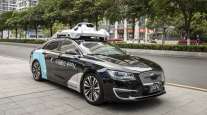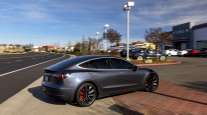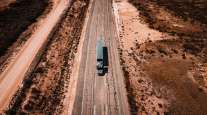Lawyer David Estrada Takes On Autonomous Safety Questions at Nuro

[Stay on top of transportation news: Get TTNews in your inbox.]
When I first met Silicon Valley lawyer David Estrada in 2014, he was an executive at Lyft Inc. who was tussling with New York City regulators. Lyft wanted to allow its drivers to ferry passengers around the city without special licenses. He lost that battle but won the war, helping to persuade dozens of states and countries to change their laws and usher in the age of ride-hailing.
It turns out that Estrada’s two years at Lyft were just one part of a 15-year slalom through some of Silicon Valley’s most disruptive companies. He had previously worked at Google X, crafting the first autonomous vehicle legislation in states like California, Florida and Nevada. After Lyft, he moved to Kitty Hawk, Larry Page’s secretive flying car company, and then became the head of legal and policy at Bird Rides Inc., nudging more than 100 U.S. cities and several countries to accept (though not necessarily embrace) street-side electric scooter rentals.
Now Estrada is taking on a new role at Nuro Inc., a Mountain View, Calif.-based self-driving car startup founded by two of his former Google colleagues and backed by nearly $1 billion from SoftBank Group Corp.’s Vision Fund. Nuro envisions autonomous cars not only without drivers but without passengers, either. Its goal is to create lightweight vehicles designed for delivering packages, groceries and meals to people’s homes.
“My hope is that I can help Nuro achieve the first commercial success with autonomous vehicles, which is really what I set out to do when I started on this path back at Google,” says Estrada, who must first convince regulators and citizens who will likely be skeptical of another wave of Silicon Valley-style disruption in their communities.

Estrada speaks at the South by Southwest conference during his tenure as Bird chief policy officer. (Callaghan O'Hare/Bloomberg News)
Nuro completed a pilot program to deliver groceries this year in Scottsdale, Ariz. Next year in Houston, it plans to start delivering food from Kroger Co. and Domino’s Pizza Inc. via an upgraded electric vehicle prototype that can travel up to 25 mph.
Estrada will eventually have to navigate a tangle of state and federal authorities. States license individual drivers and oversee their roads and highways, while the National Highway Traffic Safety Administration regulates federal motor vehicle safety standards. The Feds must be convinced to accommodate an entirely new class of self-driving delivery vehicles that theoretically don’t need steering wheels, seats, seat belts, windshield wipers or rear-view mirrors. Nuro’s application for an exemption from safety standards for its vehicles is pending.
Estrada plays up the safety of Nuro cars, which are designed to tolerate damage to its cargo in collisions (what’s a few broken eggs in a crash?) while minimizing the impact to other vehicles, pedestrians and pets.
He’ll face other concerns as well. In addition to further congesting already clogged city streets, driverless delivery vehicles threaten to put more than 400,000 delivery drivers in the U.S. out of business.
Estrada argues that Nuro cars won’t supplant existing delivery people but expand the overall market while creating more jobs inside supermarkets and restaurants and lowering the cost of home delivery services like DoorDash and UberEats. Of course, he’ll have to deliver that message at a time when Amazon.com Inc. is trying to eliminate cashier jobs with its Go store, and chains like McDonald’s Corp. are working on automating functions like the drive-through.
Which is why Silicon Valley companies pay him the big bucks. Nuro co-founder and President Dave Ferguson acknowledges the formidable regulatory and PR challenges and says he hopes Estrada can “push us over the finish line.”
Want more news? Listen to today's daily briefing:




